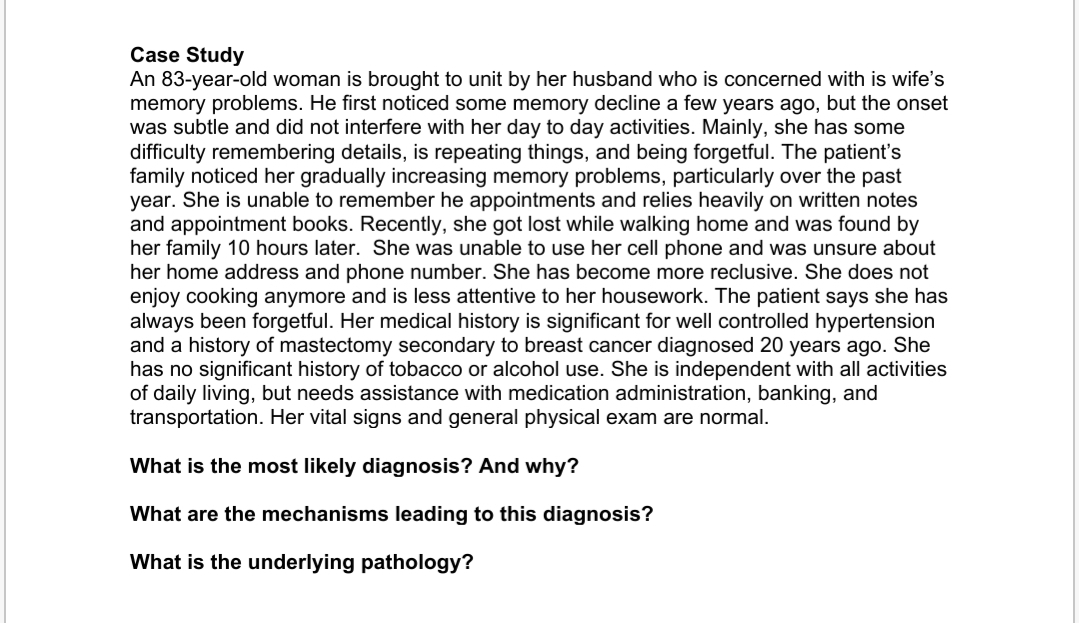Case Study An 83-year-old woman is brought to unit by her husband who is concerned with is wife's memory problems. He first noticed some memory decline a few years ago, but the onset was subtle and did not interfere with her day to day activities. Mainly, she has some difficulty remembering details, is repeating things, and being forgetful. The patient's family noticed her gradually increasing memory problems, particularly over the past year. She is unable to remember he appointments and relies heavily on written notes and appointment books. Recently, she got lost while walking home and was found by her family 10 hours later. She was unable to use her cell phone and was unsure about her home address and phone number. She has become more reclusive. She does not enjoy cooking anymore and is less attentive to her housework. The patient says she has always been forgetful. Her medical history is significant for well controlled hypertension and a history of mastectomy secondary to breast cancer diagnosed 20 years ago. She has no significant history of tobacco or alcohol use. She is independent with all activities of daily living, but needs assistance with medication administration, banking, and transportation. Her vital signs and general physical exam are normal. What is the most likely diagnosis? And why? What are the mechanisms leading to this diagnosis? What is the underlying pathology?
Case Study An 83-year-old woman is brought to unit by her husband who is concerned with is wife's memory problems. He first noticed some memory decline a few years ago, but the onset was subtle and did not interfere with her day to day activities. Mainly, she has some difficulty remembering details, is repeating things, and being forgetful. The patient's family noticed her gradually increasing memory problems, particularly over the past year. She is unable to remember he appointments and relies heavily on written notes and appointment books. Recently, she got lost while walking home and was found by her family 10 hours later. She was unable to use her cell phone and was unsure about her home address and phone number. She has become more reclusive. She does not enjoy cooking anymore and is less attentive to her housework. The patient says she has always been forgetful. Her medical history is significant for well controlled hypertension and a history of mastectomy secondary to breast cancer diagnosed 20 years ago. She has no significant history of tobacco or alcohol use. She is independent with all activities of daily living, but needs assistance with medication administration, banking, and transportation. Her vital signs and general physical exam are normal. What is the most likely diagnosis? And why? What are the mechanisms leading to this diagnosis? What is the underlying pathology?
Surgical Tech For Surgical Tech Pos Care
5th Edition
ISBN:9781337648868
Author:Association
Publisher:Association
Chapter23: Peripheral Vascular Surgery
Section: Chapter Questions
Problem 1CS
Related questions
Question
.

Transcribed Image Text:Case Study
An 83-year-old woman is brought to unit by her husband who is concerned with is wife's
memory problems. He first noticed some memory decline a few years ago, but the onset
was subtle and did not interfere with her day to day activities. Mainly, she has some
difficulty remembering details, is repeating things, and being forgetful. The patient's
family noticed her gradually increasing memory problems, particularly over the past
year. She is unable to remember he appointments and relies heavily on written notes
and appointment books. Recently, she got lost while walking home and was found by
her family 10 hours later. She was unable to use her cell phone and was unsure about
her home address and phone number. She has become more reclusive. She does not
enjoy cooking anymore and is less attentive to her housework. The patient says she has
always been forgetful. Her medical history is significant for well controlled hypertension
and a history of mastectomy secondary to breast cancer diagnosed 20 years ago. She
has no significant history of tobacco or alcohol use. She is independent with all activities
of daily living, but needs assistance with medication administration, banking, and
transportation. Her vital signs and general physical exam are normal.
What is the most likely diagnosis? And why?
What are the mechanisms leading to this diagnosis?
What is the underlying pathology?
Expert Solution
This question has been solved!
Explore an expertly crafted, step-by-step solution for a thorough understanding of key concepts.
Step by step
Solved in 2 steps

Recommended textbooks for you

Surgical Tech For Surgical Tech Pos Care
Health & Nutrition
ISBN:
9781337648868
Author:
Association
Publisher:
Cengage

Surgical Tech For Surgical Tech Pos Care
Health & Nutrition
ISBN:
9781337648868
Author:
Association
Publisher:
Cengage